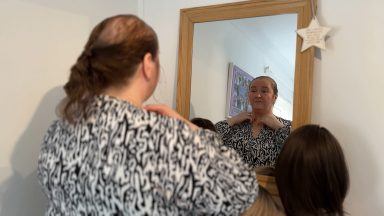Scottish Government plans to allow transgender people to choose their own gender in this year’s census have been given the go ahead by appeal judges.
Judges Lady Dorrian, Lord Malcolm and Lord Boyd rejected an appeal on Thursday brought by feminist group Fair Play for Women Ltd.
The campaigners went to the Inner House of the Court of Session on Wednesday to argue that judge Lord Sandison was wrong in ruling the proposal was wrong.
The group objected to a proposal put forward by the Scottish ministers which allows people to choose a different sex to the one registered at birth when answering a census question on sex.
The proposal has been published in guidance which was issued by the National Records of Scotland in August last year.
Transgender rights activists have welcomed the move believing that it will have no impact on the quality of data.
They believe that people should be able to answer in a way that reflects their normal everyday experiences.
Now, Lady Dorrian, Lord Malcolm and Lord Boyd have upheld their colleague’s decision.
A court official confirmed the Inner House had “adhered” to Lord Sandison’s judgement and had “refused” the appeal. The official also said the Inner House judge would issue an opinion explaining the reasons for their decision in the near future.
A statement issued by Fair Play for Women said that the group was “surprised” and “disappointed” by the decision.
The group made reference to a judgement made by an English court in which a judge ruled that it would be unlawful to allow people living there to self-identify their gender.
The statement read: “This is a setback in the fight to protect women and girls. But we have always known it will be a long haul.
“We won in England and Wales, and last week For Women Scotland won their case.
“This is one skirmish in a long fight and we are not deterred. We know public opinion is with us.
“Our support is growing all the time. We are disappointed but not disheartened.
“We will consider very carefully the full judgement when it is issued before making any further comment or decisions.”
At a hearing earlier this month, Fair Play for Women’s advocate Roddy Dunlop QC, argued that pre-existing legislation and case law surrounding the issue in Scotland meant that the are two lawful courses of action to be taken with answering questions on sex.
Mr Dunlop said the first lawful course of action to be taken is for people to answer based upon what is recorded on their birth certificate.
The lawyer told Lord Sandison that the second lawful course of action would be for people to answer the question based upon what is recorded on their gender recognition certificate.
Mr Dunlop also pointed to a recent judgement in an English court in which a judge there stopped a similar proposal being adopted for the census south of the border.
The English judge – Mr Justice Swift – ruled that people answering the sex question couldn’t “self identify” in their answers. Mr Justice Swift believed the pre-existing legislation, the 1920 Census Act, dictated that people weren’t able to self identify.
However, in his judgement, Lord Sandison said the English judgement was not binding on a Scottish court.
He said that the 1920 Census Act in Scotland contained distinctions from the English equivalent.
Lord Sandison said these distinctions in the legislation allowed the Scottish ministers to allow people to ‘self identify’ when answering the sex question.
On Wednesday, the group’s new lawyer Gerry Moynihan QC, said a policy document was unlawful if it sanctioned or approved what would be illicit conduct on the behalf of the recipients of the guidance. He said the self identification plans fell into this category.
Mr Moynihan told the judges the term sex was normally used in a binary form in contrast to gender which can be non-binary.
He said the terms ceased to be interchangeable when it came to gender being used in a non-binary way.
He said: “At the heart of the issue here is that by conflating the two what the guidance does is confuse a binary with a non-binary term.”
But the Inner House of the Court of Session refused to uphold Mr Moynihan’s submissions.
Follow STV News on WhatsApp
Scan the QR code on your mobile device for all the latest news from around the country
























